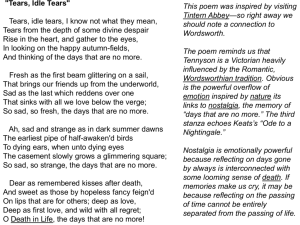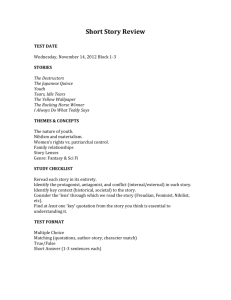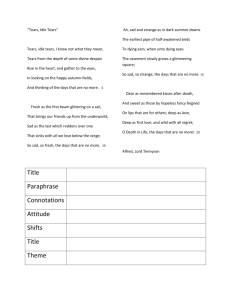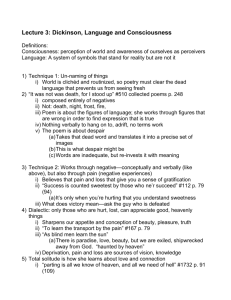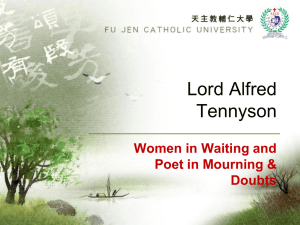J. Hillis Miller: Literature Matters Today
advertisement
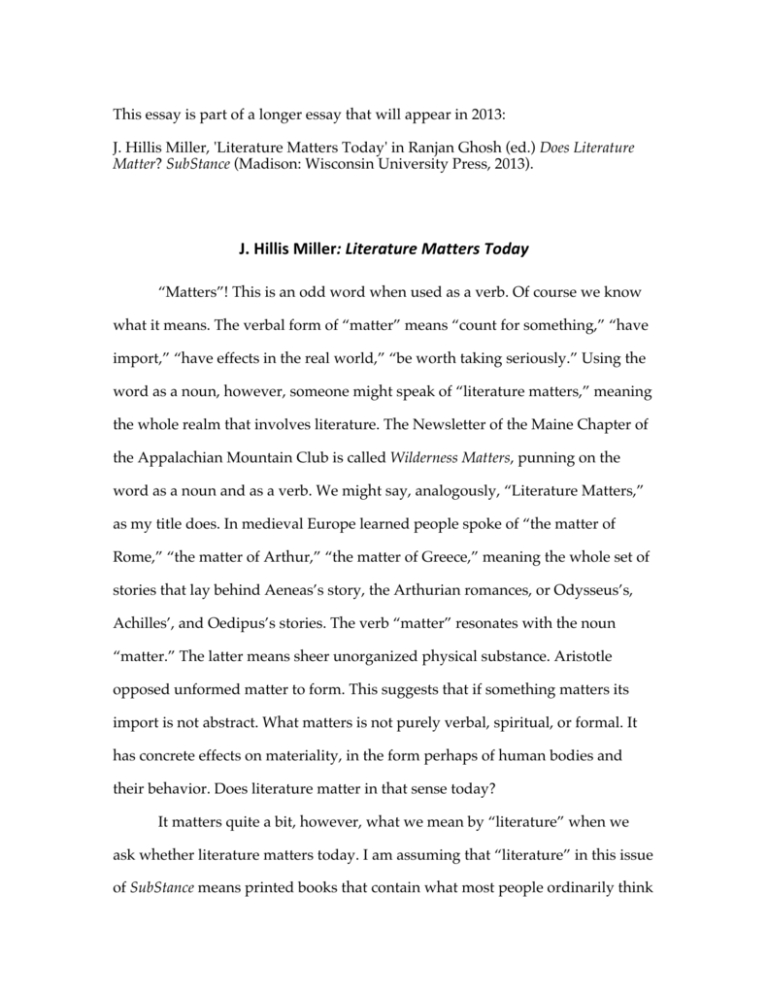
This essay is part of a longer essay that will appear in 2013: J. Hillis Miller, 'Literature Matters Today' in Ranjan Ghosh (ed.) Does Literature Matter? SubStance (Madison: Wisconsin University Press, 2013). J. Hillis Miller: Literature Matters Today “Matters”! This is an odd word when used as a verb. Of course we know what it means. The verbal form of “matter” means “count for something,” “have import,” “have effects in the real world,” “be worth taking seriously.” Using the word as a noun, however, someone might speak of “literature matters,” meaning the whole realm that involves literature. The Newsletter of the Maine Chapter of the Appalachian Mountain Club is called Wilderness Matters, punning on the word as a noun and as a verb. We might say, analogously, “Literature Matters,” as my title does. In medieval Europe learned people spoke of “the matter of Rome,” “the matter of Arthur,” “the matter of Greece,” meaning the whole set of stories that lay behind Aeneas’s story, the Arthurian romances, or Odysseus’s, Achilles’, and Oedipus’s stories. The verb “matter” resonates with the noun “matter.” The latter means sheer unorganized physical substance. Aristotle opposed unformed matter to form. This suggests that if something matters its import is not abstract. What matters is not purely verbal, spiritual, or formal. It has concrete effects on materiality, in the form perhaps of human bodies and their behavior. Does literature matter in that sense today? It matters quite a bit, however, what we mean by “literature” when we ask whether literature matters today. I am assuming that “literature” in this issue of SubStance means printed books that contain what most people ordinarily think of these days as “literature,” that is, poems, plays, and novels. Just what is “literary” about poems, plays, and novels is another matter, to which I shall return. It is often taken for granted that what most matters about literature, if it matters at all, is the accuracy with which it reflects the real world or functions as a guide to conduct for readers living in that world. The 2500-year-old mimetic paradigm, going back to the Greeks, in its multitude of permutations, has had, and still has, great power, at least in the Western world. A little reflection, however, will show that this paradigm is extremely problematic. It is easily contested or easily made more complicated, as I shall later on briefly show. The reader will recognize that adding “today” to the name of this issue of SubStance, as I have done, is a move that matters. Literature’s import differs in different times, places, and societies. My interest is in the question of whether literature matters now, today, in the fall of 2011, here in the United States of America (since I know that best), but also in the global here and now within which all we human beings, Americans and the rest, more and more live from moment to moment today. I note from the outset that this issue of SubStance and dozens of similar books and essays would not be necessary if the mattering of literature today were not in doubt. All who love literature are collectively anxious today about whether literature matters. No such issue of a journal would have likely seemed necessary in Victorian England, for example, my original field of specialization. To middle and upper class literate Victorians the assumption that literature matters quite a lot was so much taken for granted as almost never to be a matter for interrogation. “Literate” and “literature” have the same root, meaning written “letters.” You are literate if you can make sense of written letters. You are then “lettered.” Literature is made of letters, marks made on paper by some writing technology or other. The primary technology was printing presses in the epoch from the seventeenth century to the present. That was the period of what we Westerners generally mean by “literature.” Victorian readers took it for granted that printed literature, especially in the form of novels, reflected back to them the everyday social world they lived in. Novels, moreover, taught them how to behave in courtship and marriage, as well as in many other regions of everyday life. That way of assuming that literature matters may explain the continued power of the mimetic, “realist” paradigm. Literature, however, was also the chief way in which Victorians could enjoy the pleasures of entering into an imaginary world invented for them by someone more gifted than they in manipulating language. Those pleasures were often seen as guilty and dangerous, especially for young women, but also for young men. Think of Catherine Morland, the heroine of Jane Austen’s Northanger Abbey, or of Conrad’s Lord Jim. Flaubert’s Emma Bovary is the paradigmatic example of fictional characters corrupted by reading literature. These two assumptions about why literature matters were in tension in Victorian culture and in European culture generally. That tension defined the social role the Victorian literate middle and upper classes literature assumed literature to have. Think of it! The Victorians had no film, no radio, no television, no video games, no DVDs, no Internet, no iPhoto. Such technological impoverishment! They had only printed books, newspapers, and magazines to satisfy their needs both for reflective mimesis and for enjoying the imaginary. * I shall now dare to speak briefly about why literature has mattered to me. Though I am not quite a Victorian, I do go back, believe it or not, to a time when the only forms of telecommunication besides books available to me were radio, telephone, record players, and, quite infrequently, films. I lived in a small village in upstate New York. I was fascinated by literature and read much as a child, though more for the pleasures of the imaginary than for any presumption that reading literature was teaching me how to behave correctly in everyday life. I could have cared less about that! I also took spontaneous pleasure, as I have elsewhere recounted in detail, in the word play of Lewis Carroll’s Alice books (On Literature 156-9), and of A. A. Milne’s Winnie the Pooh books. Though my mother had been a high school teacher of English and my father was a smallcollege president who held a PhD in psychology directed by John Dewey at Columbia, my literary knowledge was pretty marginal when I went off to Oberlin College planning to be a physics major. I shifted from Physics to literature primarily because I “loved literature,” but also because I found literature extremely puzzling. Literature seemed to me a challenge to explanation something like strange data from a galaxy, for example from a black hole. When I got to Oberlin I discovered that many students there knew immensely more about literature than I did. I had never heard of T. S. Eliot. I had one good literature teacher in high school. He taught American literature. But mostly he taught the names of major works and authors of American literature. So I knew that there was somebody called St. Jean de Crèvecœur in the 18th century who wrote a book called Letters from an American Farmer, but I never read it. We did not do any reading of original works in that class, as well as I can remember, and Crèvecœur’s book was not in my home library. At Oberlin the teaching of literature was quite good. It did involve much reading of actual literary texts from all “periods,” as I found when I shifted to become an English major. Oberlin had courses in the whole range of English literature, even now-marginalized topics like 18th-century poetry after Dryden and Pope and before Wordsworth. I wonder how many such programs still exist in the United States. They seem pretty old-fashioned now. In spite of that training, I remain to this day puzzled by literary works. I remember the poem that exemplified my puzzlement and still does so. This is a short poem by Tennyson, one of the songs in The Princess, called “Tears, Idle Tears.” It is a wonderful poem. I looked at this poem when I was still a physics major and found it an exceedingly strange use of language. In my science courses, I was taught to say the truth straightforwardly, to explain anomalies, and to use language in as uncomplicated a way as possible. Tennyson seemed to me to do no such things. The poem begins: Tears, idle tears, I know not what they mean, Tears from the depth of some divine despair Rise in the heart, and gather to the eyes, In looking on the happy Autumn-fields, And thinking of the days that are no more. (Tennyson, “Tears”) I asked myself, “What in the world does this mean?” What does Tennyson mean by calling his tears idle? In what sense are these tears idle? Why did he write, “I know not what they mean”? I did not know what they mean either. The poem is very beautiful. There is no doubt about that, but so what? And “tears from the depth of some divine despair”? What does “divine despair” mean? It must mean despair of some god. What god? Gods are not supposed to despair. What is this god in despair about? Why are the autumn fields happy? I thought they were just inhuman matter. In short, I had dozens of questions about just these few lines. It seems to me that simply to read the poem out loud to students, as teachers often do, and to say how beautiful it is, is not enough. Yes, I agree. It is beautiful. But what does it mean? I think we are justified in demanding a high degree of “explicability” from literary works and in demanding that our teachers help students in this hermeneutic work. Why, I continued to wonder, should it matter to me whether I read and understand this poem or not? I wanted to figure out answers to these questions, to account for the poem in the way astrophysicists account for data from outer space. Decades after my shift from physics to literature, I wrote an essay trying, belatedly, to answer those questions I had about “Tears, Idle Tears” (Miller, “Temporal Topographies”). What was wrongheaded about my original project took me some years to discover. I am still discovering, that is, still trying to come to terms with the irreconcilability of hermeneutics and poetics, meaning and the way meaning is expressed (de Man 87-8). A shorthand description of my mistake would be to say that data from the stars and the linguistic “matter” that makes up poems require fundamentally different methodologies of “accounting for.” I have spent my whole life trying to account for various presumptively “literary” works. That is my vocation: reading, teaching, lecturing, and writing about print literature. Literature matters a great deal to me.
